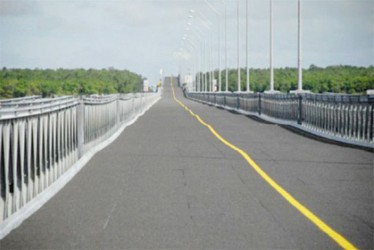The Berbice Bridge Company Inc (BBCI) is in a “parlous state” and is in need of a rescue package and Chartered Accountant Christopher Ram has restated that the only way for it to survive is for government to intervene.
“The BCCI is insolvent; it cannot pay its debts,” Ram said as he and fellow commentator Ramon Gaskin addressed several national issues as they wrapped up their ‘Post May 11, 2015 – Challenges and Choices’ discussion series at the National Library on Friday. He said that the company needs a rescue package and the only way for it to survive is for government to step in.
In 2013, the Private Sector Commission (PSC) had said that it would not accept government interference in the management of private companies like the BBCI. “The Berbice Bridge Company is owned 80% by Guyanese private sector interests, including pension funds and 20% by an institutional investor, the National Insurance Scheme (NIS), that also holds non-voting preference stock in the company and provides one of the few opportunities for a good investment return on Guyanese workers’ NIS contributions and may also be considered critical to the future life of the Scheme. As far as we are aware, the Government directly or indirectly has no investment in, or liability relating to, the bridge at this time,” the PSC had said in a statement. NIB

Notwithstanding the PSC’s statements, last year the BBCI wrote to the NIS—the holder of $950 million on preferred shares and other stakeholding—saying that it was unable to pay dividends for 2014 as it had not made a profit. The NIS had taken the stake in BBCI in 2013.
Ram had said that the PSC was completely misguided on the matter of BBCI shareholding. He had argued that “The ownership structure of the company is made up of ordinary share capital of $400 million and preference shares of $950 million. The holders of the ordinary shares are NIS, New GPC, Queens Atlantic and Secure International Finance Company each having $80 million each, and Hand-in-Hand and Demerara Contractors each holding $40 million.”
Ram had noted that NICIL, a government agency, owns what is called a Special Share in the company. The Articles of Amendment of the company expressly provide that in respect of specified matters, `no action can be taken by the [Bridge] Company, without the affirmative vote of the holder of the Special Share’ he had said. However, the PSC had responded that the government through NICIL no longer owned the 950 preference shares. These were purchased by the NIS.
On Friday, Ram warned of the peril that NIS faces in relation to the BBCI shares it holds saying that it has been robbed as it has been receiving no dividends. “NIS has bought some dud shares. Where is the outrage?” he questioned. He said that the decision to invest in the company was grossly irresponsible and reckless and now the NIS has a financial hole of about $6.5 billion resulting from its investment in the failed insurance company CLICO and now the BBCI.
He pointed out that the BBCI has not filed annual returns since 2011. Ram recalled that he had told the Registrar of Companies that if she did not do her statutory duty and demand that the returns be filed, he would bring action against her to compel that the returns be filed. He said that the registrar then wrote the BBCI a letter and the company responded that Finance Minister Dr Ashni Singh had given it permission not to hold its meeting and file returns up to a certain date. Singh has no authority to do this, Ram declared.
He said that he had asked for a copy of the letter but was told that it was marked ‘private and confidential’ and thus cannot be released to him.
According to Ram, there were a “conspiracy” and collusion surrounding the operations of the entity. He said that the BBCI cannot pay its debts and the only way for it to survive is for government to step in. He noted that under the BBCI agreement, inves-tors’ investments have to be recovered in 21 years but if government steps in, the investment recovery period can be much longer.
Meantime, in relation to the Guyana Sugar Corporation (GuySuCo), both Ram and Gaskin agreed that it needs to be restructured. Any serious restructuring of GuySuCo must include a cut in the labour force, Gaskin said while Ram noted that 76% of the company’s land are on state lease for which it pays $1,000 per acre per year. He also said that the company has not been paying its Pay As You Earn Tax (PAYE) and NIS payments for its workers for years. “These things constitutes subsidies,” he said while noting that these are not included when subsidies for the company are talked about.
Further, he noted, since 2009, GuySuCo has not tabled financial statements but parliamentarians voted money for it anyway. “We are grossly irresponsible,” Ram said while adding that “in its present format, GuySuCo cannot succeed.” He said that no money ought to be voted to companies when there is no accounting. He said that to reform GuySuCo needs a little boldness and imagination which the political parties do not seem to have.
Among the suggestions were trimming the 16,000 workers to about 7,000. Those who are let go could be given severance payments of about $1 million each. The closure of the Demerara estates in an orderly fashion was also suggested with other crops taking the place of sugarcane.
Ram noted that the biggest cost to GuySuCo is labour and it would also take a massive amount to restructure fields to enable mechanization. Gaskin emphasised that sugar has to be restructured so that it is not a burden to the taxpayer and the treasury.




